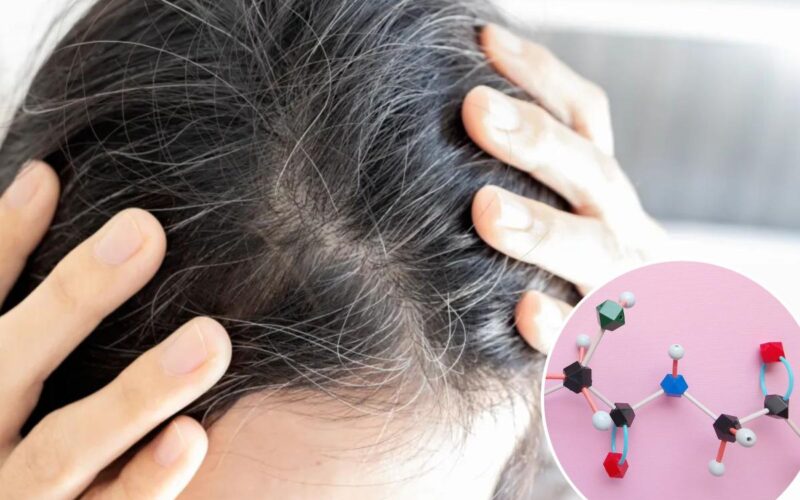Can you eat your way to keeping gray hair at bay?
Many people go to great lengths to cover up their grays, but fans say one buzzy antioxidant may help to stop that discoloration before it event starts.
Why do we go gray?
Lots of things that contribute to graying hair, including genetics, aging and stress. While the first two are outside of our control, there are things we can do about the latter.
“When we come under stress. we produce adrenaline. Adrenaline allows us to face that deadline and get it done but too much chronic adrenaline is bad for the heart,” Leslie Kenny, founder of Oxford Health Span and co-founder of the Oxford Longevity Project, explained to The Post.
To protect itself, she went on, the body converts excess adrenaline into hydrogen peroxide — which is then expelled through our pores and hair follicles.
“If we don’t have enough glutathione to convert the hydrogen peroxide into water, it goes out through our hair follicles and our skin and bleaches the hair from the inside out. That’s where we get gray hair from,” she said.
What is glutathione?
Glutathione is a tripeptide comprised of three amino acids: glutamine, glycine and cysteine.
The body produces it naturally, but levels fluctuate and decline due to poor nutrition, stress, improper rest, environmental toxins — and aging.
“Glutathione is the body’s master antioxidant,” said Kenny, “If we are not getting enough of it in our diet from things like leafy greens, avocados and broccoli, then we deplete our glutathione stores and one of the places that it’s going to manifest is in premature gray hair.”
Kenny’s warning is echoed by trichologist Jill Lee, who told The Post that studies show people who gray prematurely, in their 20s and 30s, have higher levels (which cause oxidative stress and cellular damage) and lower levels of antioxidants like glutathione.
“Upping antioxidants like glutathione would likely benefit premature graying by combating the oxidative damage that is happening to the pigment producing cells called melanocytes,” she said.
Other anti-graying musts
Prematurely graying is also likely due to oxidative stress and cellular damage caused by environmental toxins, metabolic disorders and stress, according to Lee.
“Hair practitioners, dermatologists and doctors that favor a root cause approach to health will focus on antioxidant intake to combat oxidative stress, which is something that can lead to premature graying,” she said. “Genetics are often the primary driver of premature graying but environment and lifestyle factors also play a role and can accelerate it.”
While optimizing glutathione and antioxidant levels can help, Lee said it won’t compensate for systemic poor health — including smoking, high alcohol intake and processed food-heavy diets.
She advised also checking for nutritional deficiencies (like iron and B12), environmental exposures and underlying health conditions.
How to get more glutathione
Kenny says that a diet that prioritizes glutathione-rich foods should be your primary source for upping intake — but those looking to top off in other ways can try liposomal supplementation, i.e. a supplement that encapsulates glutathione in fat bubbles called liposomes.
“[It] has better absorption and is more likely to survive the enzymes in the gut that break it down and prevent absorption,” said Lee.
Getting it via IV is also effective in bypassing the gut but is cost prohibitive for most.
However, not everyone is sold on the efficacy or necessity of glutathione supplementation.
“Current scientific evidence is limited,” trichtologist Marta Teixeira stressed to The Post.
“While glutathione is a powerful antioxidant and theoretically could reduce oxidative stress in melanocytes, there is no robust clinical data showing that increasing dietary or supplemental glutathione can reliably prevent or reverse gray hair in humans.”
The body’s regulation of hair pigmentation is complex, he added, and once melanocytes lose their ability to produce pigment, antioxidants alone are unlikely to restore it.
Still, for those hoping to keep the gray away, Kenny, Lee and Teixeira all recommend prioritizing an antioxidant rich diet, avoiding smoking and managing stress.
“While these strategies won’t reverse gray hair, they may support overall hair health and potentially slow further premature graying,” said Teixeira.








